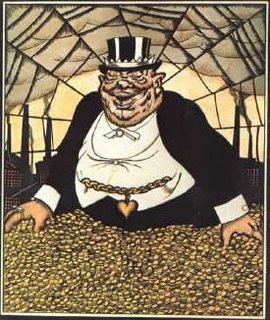In the Middle East conspiracy theory is an undercurrent of mainstream politics, as it is here in North America. In the case of Saddams execution there are those who don't believe he really died since he had many stand ins and doubles.
My favorite theory though is this one; The wrong man was executed.One of the more poupular post execution commentaries circulating internationally is this one, which exposes the authentic conspiracy around Saddams death, the Americans needed to shut him up.
Humiliation at the end of a rope The spectacle of Saddam Hussein's execution, shown in pornographic detail to the whole world, was deeply shocking to those of us who respect propriety and human dignity. The vengeful Shiite mob that was allowed to taunt the man's last moments, and the vicious executioners who released the trapdoor while he was saying his prayers, turned this scene of so-called Iraqi justice into a public lynching.
One does not have to be any kind of Saddam sympathiser to be horrified that he should have been executed — and, so obscenely, on the dawn of Islam's holy feast of Eid al-Adha, which flagrantly defies religious practice and was an affront to the Islamic world.
What was the executioners' hurry? Why was Saddam condemned for one of his lesser crimes, ignoring the far larger ones for which many of his victims had sought retribution? In their unseemly haste to kill him, the judges ended up looking mean-minded, bloodthirsty and vengeful, while Saddam retained a dignity to the end that drew the reluctant admiration of many of his enemies.
 It was always clear that Saddam's fate was sealed from the moment US forces "got 'im", in Paul Bremer's tasteless phrase. He was to be used as a trophy of a mindless and catastrophic war, to redeem America's dented image. But it was also essential to stop him revealing secrets about the West's past enthusiasm in supporting and arming his regime. Hence he was tried on the relatively minor charge of killing 148 people in the village of Dujail, after a plot to assassinate him. Far better to put him away safely for that rather than risk his exposing Western hypocrisy, treachery and double-dealing.
It was always clear that Saddam's fate was sealed from the moment US forces "got 'im", in Paul Bremer's tasteless phrase. He was to be used as a trophy of a mindless and catastrophic war, to redeem America's dented image. But it was also essential to stop him revealing secrets about the West's past enthusiasm in supporting and arming his regime. Hence he was tried on the relatively minor charge of killing 148 people in the village of Dujail, after a plot to assassinate him. Far better to put him away safely for that rather than risk his exposing Western hypocrisy, treachery and double-dealing.
Of course had Saddam been given a fair trial in the ICC he would have exposed America as the handmaiden of his regime. Something the Americans did not want to happen despite their crocodile tears over his fast hanging.
What other surprises the trial of Hussein could have revealed is a major question.
For example, the media often write that on July 25, 1990, the U.S. ambassador to Baghdad, April Glaspie  , was summoned to the dictator's office for "comprehensive political discussions" before the Iraqi invasion of Kuwait on August 2. Glaspie allegedly told Hussein: "We have no opinion on the Arab-Arab conflicts, like your border disagreement with Kuwait."
, was summoned to the dictator's office for "comprehensive political discussions" before the Iraqi invasion of Kuwait on August 2. Glaspie allegedly told Hussein: "We have no opinion on the Arab-Arab conflicts, like your border disagreement with Kuwait."

A Fateful moment: Glaspie
appears to give Saddam
the go-ahead in Kuwait.
--------------------------------
[Editor's Note: Glaspie was reported to have said in part, "We have no opinion on Arab-Arab conflicts, like your border disagreement with Kuwait. ... James Baker has directed our official spokesmen to emphasize this instruction. We hope you can solve this problem using any suitable methods ... All that we hope is that these issues are solved quickly].
But the "border disagreement" turned out into a full-scale aggression. For Saddam, this was the beginning of the end. In Washington, he became public enemy number one when in fact before the Kuwait campaign American-Iraqi relations seemed to be improving.
Several weeks before the war, a delegation of U.S. senators visited Baghdad to assure the Iraqi authorities of Washington's benevolence. Let us point out that this visit took place after the Dujail massacre and the use of chemical weapons against Kurds in Anfal. Or didn't Washington know about that?
From Aljazeerah we get these opinions, again focusing on Saddams links to the American Regime as the reason for his untimely death.
Was Saddam The Scapegoat Or The 'Sacrificed Sheep' Of The Bush Administration? By Ali Al-Hail
Saddam's execution is inhuman By Burhanuddin Qasmi
Saddam's execution repudiated all over the world By the Workers' Party of Belgium
Was Saddam put to death before the new US Congress can ask him for information By Ronald Douglas Kennedy
When Justice Becomes Personal Revenge By Syed B. Soharwardy
And this editorial was from Lebanon just prior to Saddams lynching.
Dar Al-Hayat, Lebanon Saddam's Death Will
'Double the Pain' Original Article (English)
See:
Saddam
Iraq
Capital Punishment
Conspiracy
Find blog posts, photos, events and more off-site about:
Saddam, Hussien, Iraq, judge, court, crimes against humanity, Saddam trial,
Iraq, civiilans, death, killed, America, Bush, White-House,
Saddam Hussein,
war crimes,civilian-deaths,Kurds,Shia,Sunni,Baath,Saddam to be executed,









